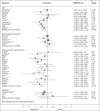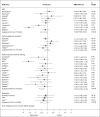Overview of the prevalence, impact, and management of depression and anxiety in chronic obstructive pulmonary disease
- PMID: 25419126
- PMCID: PMC4235478
- DOI: 10.2147/COPD.S72073
Overview of the prevalence, impact, and management of depression and anxiety in chronic obstructive pulmonary disease
Abstract
More than one third of individuals with chronic obstructive pulmonary disease (COPD) experience comorbid symptoms of depression and anxiety. This review aims to provide an overview of the burden of depression and anxiety in those with COPD and to outline the contemporary advances and challenges in the management of depression and anxiety in COPD. Symptoms of depression and anxiety in COPD lead to worse health outcomes, including impaired health-related quality of life and increased mortality risk. Depression and anxiety also increase health care utilization rates and costs. Although the quality of the data varies considerably, the cumulative evidence shows that complex interventions consisting of pulmonary rehabilitation interventions with or without psychological components improve symptoms of depression and anxiety in COPD. Cognitive behavioral therapy is also an effective intervention for managing depression in COPD, but treatment effects are small. Cognitive behavioral therapy could potentially lead to greater benefits in depression and anxiety in people with COPD if embedded in multidisciplinary collaborative care frameworks, but this hypothesis has not yet been empirically assessed. Mindfulness-based treatments are an alternative option for the management of depression and anxiety in people with long-term conditions, but their efficacy is unproven in COPD. Beyond pulmonary rehabilitation, the evidence about optimal approaches for managing depression and anxiety in COPD remains unclear and largely speculative. Future research to evaluate the effectiveness of novel and integrated care approaches for the management of depression and anxiety in COPD is warranted.
Keywords: chronic obstructive pulmonary disease; cognitive behavioral therapy; depression and anxiety; health outcomes; multidisciplinary case management; pulmonary rehabilitation.
Figures


References
-
- Ayuso-Mateos JL, Vazquez-Barquero JL, Dowrick C, et al. Depressive disorders in Europe: prevalence figures from the ODIN study. Br J Psychiatry. 2001;179:308–316. - PubMed
-
- Uher R, Payne JL, Pavlova B, Perlis RH. Major depressive disorder in DSM-5: implications for clinical practice and research of changes from DSM-IV. Depress Anxiety. 2014;31(6):459–471. - PubMed
-
- American Psychiatric Association . Diagnostic and Statistical Manual of Mental Disorders. 5th ed. Arlington, VA, USA: American Psychiatric Publishing; 2013.
Publication types
MeSH terms
LinkOut - more resources
Full Text Sources
Other Literature Sources
Medical

